‘The thing is, I mean, there’s times when you look at the universe and you think, “What about me?” and you can just hear the universe replying, “Well, what about you?”
– Thief of Time
Terry Pratchett died last week and I’m not sad.
I’m not sad, because he appears to have died peacefully, surrounded by loved ones, after an accomplished life. I’m not sad, because I didn’t know him personally, or even knew all that much about him (I’ve seen some interviews, but I’m generally not very interested in writers’ lives beyond their works). Most of all, I’m not sad, because, having read 38 of his 55 novels, I can still look forward to thousands of pages of crazy magic, witty turns of phrase, and silly footnotes.
Pratchett never wrote Batman comics. Or any comic, as far as I know (unless you count a couple of illustrated books), although some of his work has been adapted into graphic novels. Regardless, given his flair for imaginative, exciting stories full of quirky characters with even quirkier names, it shouldn’t come as a surprise that I’m a fan. Much like the adventures of the Dark Knight, I’ve compulsively read Pratchett’s stories at home and at work, on buses and airports, having gotten them from stores and libraries and friends’ collections whenever I could get my hands on them.
So Nanny Ogg, Nobby Nobbs, Cheery Littlebottom, and Cohen the Barbarian, this post is dedicated to you. And to Reg Shoe, the zombie who started the ‘undead rights’ movement. And to Captain Carrot Ironfoundersson, the huge adoptive son of dwarves (a joke Alan Moore reused in the fantasy spoof Smax), whose bright-eyed innocence becomes increasingly creepy. And to The Luggage, the multi-legged, semi-sentient, homicidal suitcase that keeps showing up. And, of course, to the Librarian, who was turned into an orangutan and decided he preferred it that way, even if he did continue to work in the library (with brief stints as police officer, keyboard player, and goalkeeper).
Mixing full-blown comedy and fantasy, Pratchett’s multiverse is a nice counterpoint to the grim seriousness of Lord of the Rings and Game of Thrones. Hand in hand with all the goofy humor, however, these books have filled my head with awesome ideas, from a city that accepts an out-of-control dragon as king because ultimately she doesn’t seem worse than regular politicians, to an illiterate savant with infinite photographic memory (a la Borges’ Funes the Memorious) who memorizes an entire library without understanding a single word.
To be sure, not everyone is into fantasy, even if many of those who snottily frown upon the genre are happy to read the ‘magical realism’ of Gabriel García Márquez and José Saramago, or incursions into ‘fantastic literature’ by Jorge Luis Borges and Italo Calvino. I’m happy to read them as well – and in Pratchett I found a writer with a less elaborate prose and more willingness to indulge in pop cultural winks (from Star Trek to Beverly Hills Cop), but who likewise draws on supernatural imagery to dig into the core of reality. After all, what is the Discworld if not a planet made up of all the stupid myths people believe in: it’s flat, populated by petty humans, gods, trolls, and creatures from every kind of lore… and it rests on top of four giant elephants, themselves on top of a turtle swimming through space.
The Discworld is less a series than a common setting, a shared universe like DC or Marvel, housing various sagas with distinct characters, themes, and atmosphere. Many of the stories take place in the city-state of Ankh-Morpork, a sprawling inter-species melting pot ruled by a fascinating, benevolent tyrant straight out of Machiavelli. This is where the City Watch books are set – a crime series about the poor bastards who try to keep the law among all the chaos (in fact, most just try to stay out of trouble). It’s also the setting for the satirical Moist von Lipwig saga, about a con artist who somehow finds himself running key institutions like the post office and the banking system.
Moreover, there are several books about the buffoonish Wizards of Unseen University, sending up the tropes of sword & sorcery. These revolve around the coward Rincewind (who keeps getting into Lovecraftian end-of-the-world scenarios despite his commitment to avoiding heroics if there is even the slightest chance of running away) and/or the academic staff under Archancellor Mustrum Ridcully (who, as is typical of academia, spend more time arguing with each other than actually doing anything).
The Witches series takes place in Lancre, in the rural side of the Discworld. It twists around traditional folklore while commenting on the power of legends and words. This is the home of Granny Weatherwax, in all her stubbornness and offbeat wisdom (‘Granny lived her life via the back door. There were only three times in your life when it was proper to come through the front door, and you were carried every time.’ – Wyrd Sisters).
Another set of novels follows the existential adventures of the anthropomorphic personification of Death (you know, the scythe-wielding skeleton), who rides around on a horse called Binky. In the Discworld, Death keeps quitting its job and going native among the living. Its granddaughter, Susan Sto Helit, has helped combat the Auditors of Reality, who are basically celestial bureaucrats.
And then there are a handful of isolated books which don’t fit with any of these series.
Aside from the occasional Easter Egg and cameos by peripheral characters (especially in Ankh-Morpork), Pratchett tended to stay away from crossovers, with a few exceptions. The Wizards often play an important role in Death’s books and they meet up with Lancre’s Witches in Lords and Ladies. The Witches travel to Ankh-Morpork for the operatic farce Maskerade. The most widespread team-up takes place in the highly entertaining The Last Hero, probably because for once each page was beautifully illustrated by Paul Kidby, so Pratchett was letting him shine.
I can see how Terry Pratchett’s writing may not be everyone’s cup of tea. He sometimes sounds too didactic, heavy-handed, oh so British, and can never resist a gratuitous pun or play on words. Which is not to say that Pratchett’s style hasn’t evolved – it started as a spoof of hardcore fantasy, but the later works read more like epic narratives in their own right, with the jokey names and occasional shtick feeling like odd leftovers from the past.
In any case, it’s hard to deny he had a knack for amusing dialogue and clever asides:
‘And these are your reasons, my lord?’
‘Do you think I have others?’ said Lord Vetinari. ‘My motives, as ever, are entirely transparent.’
Hughnon reflected that ‘entirely transparent’ meant either that you could see right through them or that you couldn’t see them at all.
– The Truth
Then again, I don’t read Pratchett for his way with language (enjoyable as it can be) as much as for the fact that he is a master storyteller. He’s brilliant at plotting, pacing, and character development, male and female – the eccentric cast always starts out as grotesque caricatures which Pratchett then manages to humanize. In the first Discworld novel, Ankh-Morpork was still a stereotypical, proto-medieval city, but throughout the decades faithful readers have seen it slowly grow into a multicultural steampunk metropolis going through an oddball industrial revolution.
As Pratchett’s stories became more ambitious in scale, he explored larger issues, with religion, politics, war, racism, and gender being the most recurring themes. His observations mix progressive idealism with bitter cynicism:
…one of the things sometimes forgotten about the human spirit is that while it is, in the right conditions, noble and brave and wonderful, it is also, when you get right down to it, only human.
– Guards! Guards!
Some may find Pratchett’s humanist moralizing too preachy, annoying, or simplistic. But I really dig that Terry Pratchett began by doing deconstructionist satire (first of genre, then of society) and gradually challenged himself to come up with reconstructionist alternatives. When his books end on positive notes, these feel less like Hollywood-endings than like the product of a writer who regards downbeat endings as too easy a way to leave a strong final impression… Pratchett was more interested in using this imaginary universe to take his stories to original places, even flirting with utopianism. (That’s also true of the non-Discworld Nation, which is more or less grounded in reality yet ends up becoming a reimagining of British colonialism, instead of a mere indictment.)
Keeping in mind the overlap of tone and characters, there are four different types of Discworld novels. The early ones, from the 1980s, were primarily slapstick, silly but smart, close in spirit to Monty Python, The Hitchhiker’s Guide to the Galaxy, and Blackadder. In comics, the closest equivalent I can think of are Asterix the Gaul and Epicurus the Sage. The very first books set in the Discworld (The Colour of Magic, The Light Fantastic), which introduced Rincewind, are basically parodies of Tolkien. Subsequent Rincewind novels (Sourcery, Eric, Interesting Times, The Last Continent, The Last Hero) carry on in the same vein, doing madcap takes on straight-faced fantasy classics like Robert E. Howard’s Conan, the various versions of Faust, and countless orientalist adventures. With its provocative tale of revolution, Interesting Times is perhaps the only one to fully transcend into another level.
Yet, even in his initial period, you can see Pratchett striving to go beyond pure nonsense. Yes, Mort is hilarious, but it also timidly tries to be poetic (‘People don’t alter history any more than birds alter the sky, they just make brief patterns on it.’). Yes, Wyrd Sisters is a screwball homage to William Shakespeare (with Kubrick’s The Shining thrown in), but it also comments on political rhetoric and iconography. And yes, Pyramids is insane, but it revolves around a powerful metaphor for oppressive tradition.
A second type of novel is primarily concerned with our world, examined through surreal satire. The first book about the Ankh-Morpork City Watch, Guards! Guards!, still has plenty of absurdist humor, but most of the appeal lies the in the way it mercilessly mocks politics and society. The same can be said for other entries in the City Watch series, such as Men at Arms (where the cops have to face racial riots, not to mention the invention of the gun) or the excellent Jingo (where the main crime being investigated is war itself).
‘Fortune favours the brave, sir,’ said Carrot cheerfully.
‘Good. Good. Pleased to hear it, captain. What is her position vis à vis heavily armed, well prepared and excessively manned armies?’
‘Oh, no-one’s ever heard of Fortune favouring them, sir.’
– Jingo
Small Gods is Pratchett’s magnum opus for this type of story, ridiculing religion with the verve of Python’s Life of Brian. Further examples include The Truth, which satirizes journalism, and the Moist von Lipwig trilogy (Going Postal, Making Money, Raising Steam), which reads like a Swiftian history of capitalism.
Other books can be described as just downright, no-holds-barred fantasy, even if of a tongue-in-cheek kind. Less campy than Xena the Warrior Princess and denser than Shrek, but from a not too distant breed. The point of magic here is to provide wonder and thrills: it’s escapist fun, tempered with Pratchett’s philosophical musings. The best of this bunch has got to be Reaper Man, the second novel where Death goes AWOL, this time with the unintended consequence that some people stop dying (Saramago would go on to explore a similar idea in Death with Interruptions).
Many of these novels reimagine fables and fairy tales, especially in the Witches series (Witches Abroad, Lords and Ladies), but also in the City Watch entry Feet of Clay, which is a murder mystery about golems. Although less mordant than the books in the previous section, these also involve taking real world phenomena and putting a supernatural spin on them, whether it’s movies (Moving Pictures), rock and roll (Soul Music), opera (Maskerade), Christmas (Hogfather), or college soccer (Unseen Academicals).
Finally, starting with the revisionist vampire tale Carpe Jugulum, in the late 1990s Terry Pratchett entered his gothic phase. The potential of horror tropes to symbolize the most sinister side of humanity was best expressed by Granny Weatherwax in that book, when she explained that people need vampires because ‘they helps ’em remember what stakes and garlic are for.’ The result were many novels that felt less like satires than like macabre allegories, often involving the Transylvania-like region of Überwald. Sure, there were still surrealist gags, but they were now closer to The League of Gentlemen than to The Mighty Boosh.
It wasn’t just the Witches series. Pratchett took stone-faced Sam Vimes, the head of the City Watch, into some seriously dark places in The Fifth Elephant, Night Watch, Thud!, and Snuff. Of these, Night Watch is easily my favorite, as Vimes travels back in time to the Discworld’s version of the 1871 Paris Commune and things get fucking intense…
People on the side of The People always ended up disappointed, in any case. They found that The People tended not to be grateful or appreciative or forward-thinking or obedient. The People tended to be small-minded and conservative and not very clever and were even distrustful of cleverness. And so the children of the revolution were faced with the age-old problem: it wasn’t that you had the wrong kind of government, which was obvious, but that you had the wrong kind of people.
– Night Watch
Around this time, Sam Vimes also played a minor role (along with the reporters from The Truth) in Monstrous Regiment, which is possibly the Discworld’s darkest novel. No, wait, that would be The Amazing Maurice and His Educated Rodents, which underneath the whimsical premise of talking cats and mice turns out to be scary as all hell!
I’m not too familiar with Terry Pratchett’s non-Discworld stuff (not yet, anyway). Nation is a cool book. Dodger could have been one as well if it didn’t come across as so pleased with itself, repeating the same beats over and over again, and uncharacteristically submissive to the Crown. Good Omens, an apocalyptic comedy about a childish antichrist, which he co-wrote with Neil Gaiman, has many misfires, but when it hits the spot you can tell Pratchett was behind it. All in all, the novels set on the Discworld are the ones that marked my life.
So with all this, where is the best place to start? Well, here are 10 books that can serve as gateway drugs:
MORT is the tale of a poor boy who gets hired as Death’s apprentice. This first novel in the Death series really sneaks up on the reader: for the most part it feels like you’re just reading a collection of laugh-out-loud funny scenes (and Karate Kid references) until you realize that the story is actually super-tightly plotted and full of great characterization.
WYRD SISTERS is the first and arguably the strongest novel in the Witches series (OK, technically it’s the second, but Equal Rites is dispensable except for completists). I would tell you to imagine a burlesque mashup of Macbeth, Hamlet, and King Lear, but it’s better than anything you can imagine!
PYRAMIDS is a frenetic ride through the Discworld’s version of Ancient Egypt, featuring a rebel prince trained by the Assassins’ Guild, a camel mathematician, and some truly mind-blowing science fiction.
GUARDS! GUARDS! kickstarted the City Watch series, dedicated to all those fine guards whose role is ‘round about Chapter Three (or ten minutes into the film) to rush into the room, attack the hero one at a time, and be slaughtered’. This is probably the novel where Pratchett achieved the most perfect balance between inducing laughter and being devastatingly misanthropic.
MOVING PICTURES sees the arrival of cinema to the Discworld. Needless to say, it’s packed with enough references to classic Hollywood to satisfy any film buff!
SMALL GODS tells the story of a god who is down to only one devout believer… and a slow-witted one at that. Since in the Discworld gods only exist if people believe in them, anything goes to gather up more followers before it’s too late.
THE TRUTH shows us the creation of Ankh-Morpork’s first proper newspaper, but it owes as much to Pulp Fiction as to His Girl Friday. Even though the book revolves mostly around new characters, this one is also a treat for fans of the City Watch series, since it provides a different perspective on Sam Vimes.
THE AMAZING MAURICE AND HIS EDUCATED RODENTS is about a Puss in Boots-like cat and his gang of educated mice who con ignorant villagers through a variation of the legend of the Pied Piper of Hamelin… Don’t be fooled by the fact that this is a Young Adult novel (which in Pratchett’s case only means it’s chockfull of sex and death). The book is a phenomenal political allegory.
MONSTROUS REGIMENT takes the familiar premise of a girl pretending to be a boy to join the army and spins one of the most thought-provoking, feminist war stories you’ll ever read.
GOING POSTAL introduces the charismatic Moist von Lipwig. You may think that the postal service isn’t an obvious topic for a knock-out farce, but Pratchett delivers one in this tale of a con man who is forced to go straight and finds out the whole system is designed for people like him.
So say hello to Death and Binky, Sir Pratchett.
Like I said, I’m not sad. After all, I can still reread passages like this one:
Now consider the tortoise and the eagle.
The tortoise is a ground-living creature. It is impossible to live nearer the ground without being under it. Its horizons are a few inches away. It has about as good a turn of speed as you need to hunt down a lettuce. It has survived while the rest of evolution flowed past it by being, on the whole, no threat to anyone and too much trouble to eat.
And then there is the eagle. A creature of the air and high places, whose horizons go all the way to the edge of the world. Eyesight keen enough to spot the rustle of some small and squeaky creature half a mile away. All power, all control. Lightning death on wings. Talons and claws enough to make a meal of anything smaller than it is and at least take a hurried snack out of anything bigger.
And yet the eagle will sit for hours on the crag and survey the kingdoms of the world until it spots a distant movement and then it will focus, focus, focus on the small shell wobbling among the bushes down there on the desert. And it will leap . . .
And a minute later the tortoise finds the world dropping away from it. And it sees the world for the first time, no longer one inch from the ground but five hundred feet above it, and it thinks: what a great friend I have in the eagle.
And then the eagle lets go.
And almost always the tortoise plunges to his death. Everyone knows why the tortoise does this. Gravity is a habit that is hard to shake off. No one knows why the eagle does this. There’s good eating on a tortoise but, considering the effort involved, there’s much better eating on practically anything else. It’s simply the delight of eagles to torment tortoises.
But of course, what the eagle does not realize is that it is participating in a very crude form of natural selection.
One day a tortoise will learn how to fly.
– Small Gods
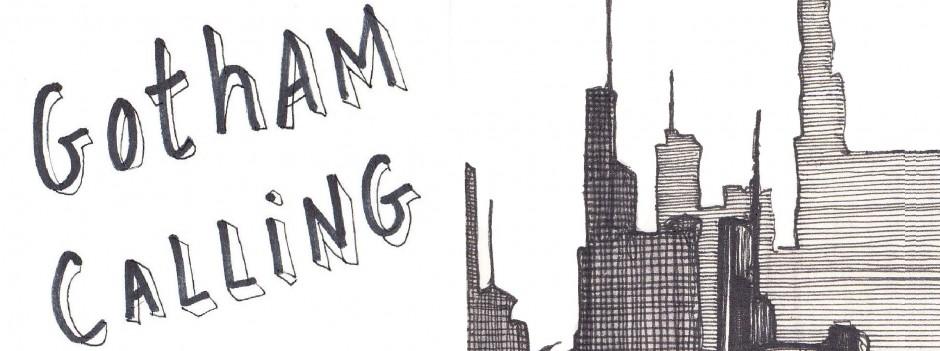
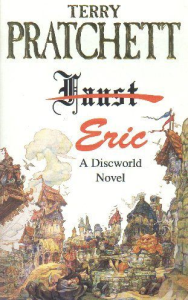
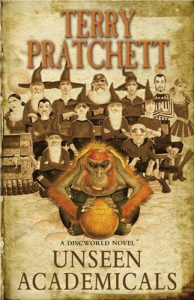
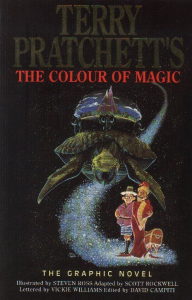
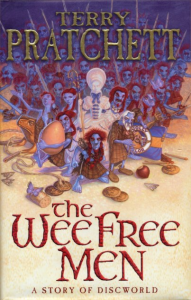
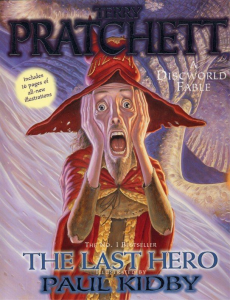
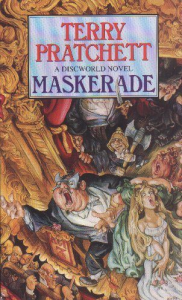
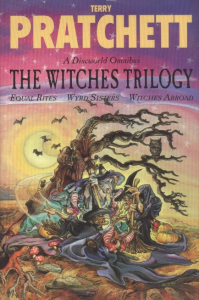
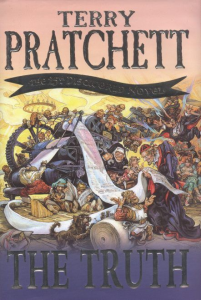
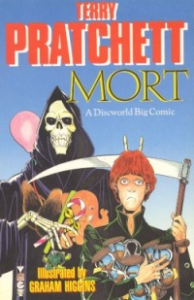
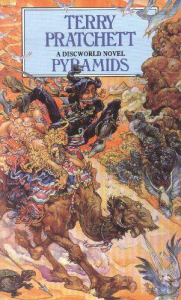
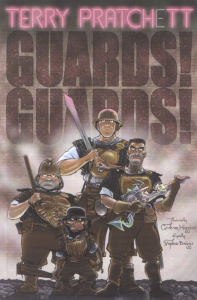
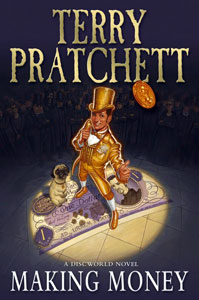

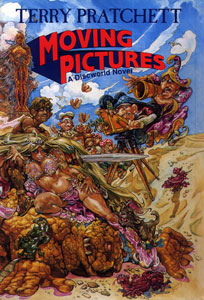
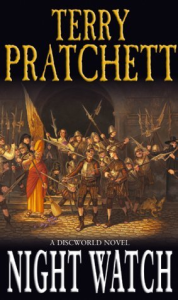
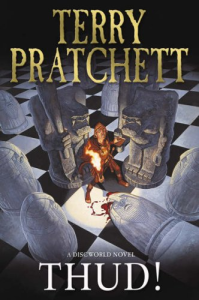
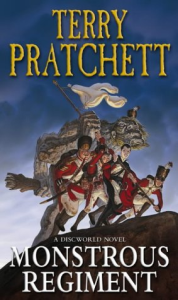
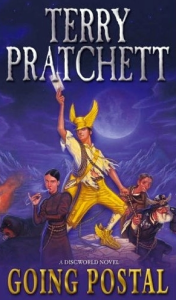
Oh, I should probably mention… Pratchett did write an introduction to a UK-only Batman trade. I photoed it and posted it to my Tumblr – here’s the link…
http://68.media.tumblr.com/5df1d257a818bca1ef3d636ec529ffd2/tumblr_o7umzzkJr51s6umbyo1_500.jpg
Wow, this is amazing!